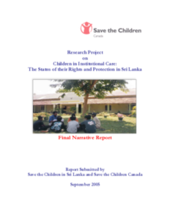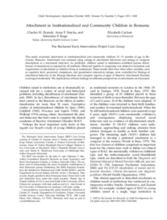Displaying 1391 - 1400 of 1463
A set of standards for boarding and residential schools. It outlines what young people can expect when they receive school care accommodation services from a registered/regulated provider.
This report presents the survey Kevin Browne and colleagues conducted in 33 European countries to identify the number and characteristics of children less than three placed in residential care without their parents for more than three months during the year ending December 31, 2003. The purpose was to assess the rate and cost of residential care as a response to children in adversity.
This document is a guideline to facilitate good policy and practice within institutional care settings for children in Timor. It addresses regulations, registration, standards of care, placement and monitoring.
Reports on the financial costs of residential care for children in the Republic of Moldova. Highlights significant financial inefficiencies and advocates for closure of residential institutions.
A brief literature review of the key findings of academic research into the effects of institutional care for vulnerable children. Contains information on the negative effects of institutional care.
A report discussing the advent and perpetuation of institutional care in Central and Eastern Europe and the Former Soviet Union prior to and since the end of the communist regime. It also provides examples of family-based care as models of care to substitute institutional care and offers recommendations to donors, NGOs and governments for child care reform based on their experience in CEE and FSU.
A set of standards for residential settings, including the young person’s welcome into care, the quality of care they should receive, contact arrangements, and listening and responding to the views of young people.
This is an issue of the Early Childhood Matters journal. Topics include community based care, out of home care, institutional care, mothers in prison, child-headed households, and other issues from around the world
A situation analysis of children in institutional care that includes policy implications and key recommendations.
This study examined attachment in institutionalized and community children 12 – 31 months of age in Bucharest, Romania.









